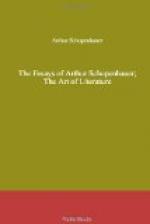In the republic of letters it is as in other republics; favor is shown to the plain man—he who goes his way in silence and does not set up to be cleverer than others. But the abnormal man is looked upon as threatening danger; people band together against him, and have, oh! such a majority on their side.
The condition of this republic is much like that of a small State in America, where every man is intent only upon his own advantage, and seeks reputation and power for himself, quite heedless of the general weal, which then goes to ruin. So it is in the republic of letters; it is himself, and himself alone, that a man puts forward, because he wants to gain fame. The only thing in which all agree is in trying to keep down a really eminent man, if he should chance to show himself, as one who would be a common peril. From this it is easy to see how it fares with knowledge as a whole.
Between professors and independent men of learning there has always been from of old a certain antagonism, which may perhaps be likened to that existing been dogs and wolves. In virtue of their position, professors enjoy great facilities for becoming known to their contemporaries. Contrarily, independent men of learning enjoy, by their position, great facilities for becoming known to posterity; to which it is necessary that, amongst other and much rarer gifts, a man should have a certain leisure and freedom. As mankind takes a long time in finding out on whom to bestow its attention, they may both work together side by side.
He who holds a professorship may be said to receive his food in the stall; and this is the best way with ruminant animals. But he who finds his food for himself at the hands of Nature is better off in the open field.
Of human knowledge as a whole and in every branch of it, by far the largest part exists nowhere but on paper,—I mean, in books, that paper memory of mankind. Only a small part of it is at any given period really active in the minds of particular persons. This is due, in the main, to the brevity and uncertainty of life; but it also comes from the fact that men are lazy and bent on pleasure. Every generation attains, on its hasty passage through existence, just so much of human knowledge as it needs, and then soon disappears. Most men of learning are very superficial. Then follows a new generation, full of hope, but ignorant, and with everything to learn from the beginning. It seizes, in its turn, just so much as it can grasp or find useful on its brief journey and then too goes its way. How badly it would fare with human knowledge if it were not for the art of writing and printing! This it is that makes libraries the only sure and lasting memory of the human race, for its individual members have all of them but a very limited and imperfect one. Hence most men of learning as are loth to have their knowledge examined as merchants to lay bare their books.
Human knowledge extends on all sides farther than the eye can reach; and of that which would be generally worth knowing, no one man can possess even the thousandth part.




